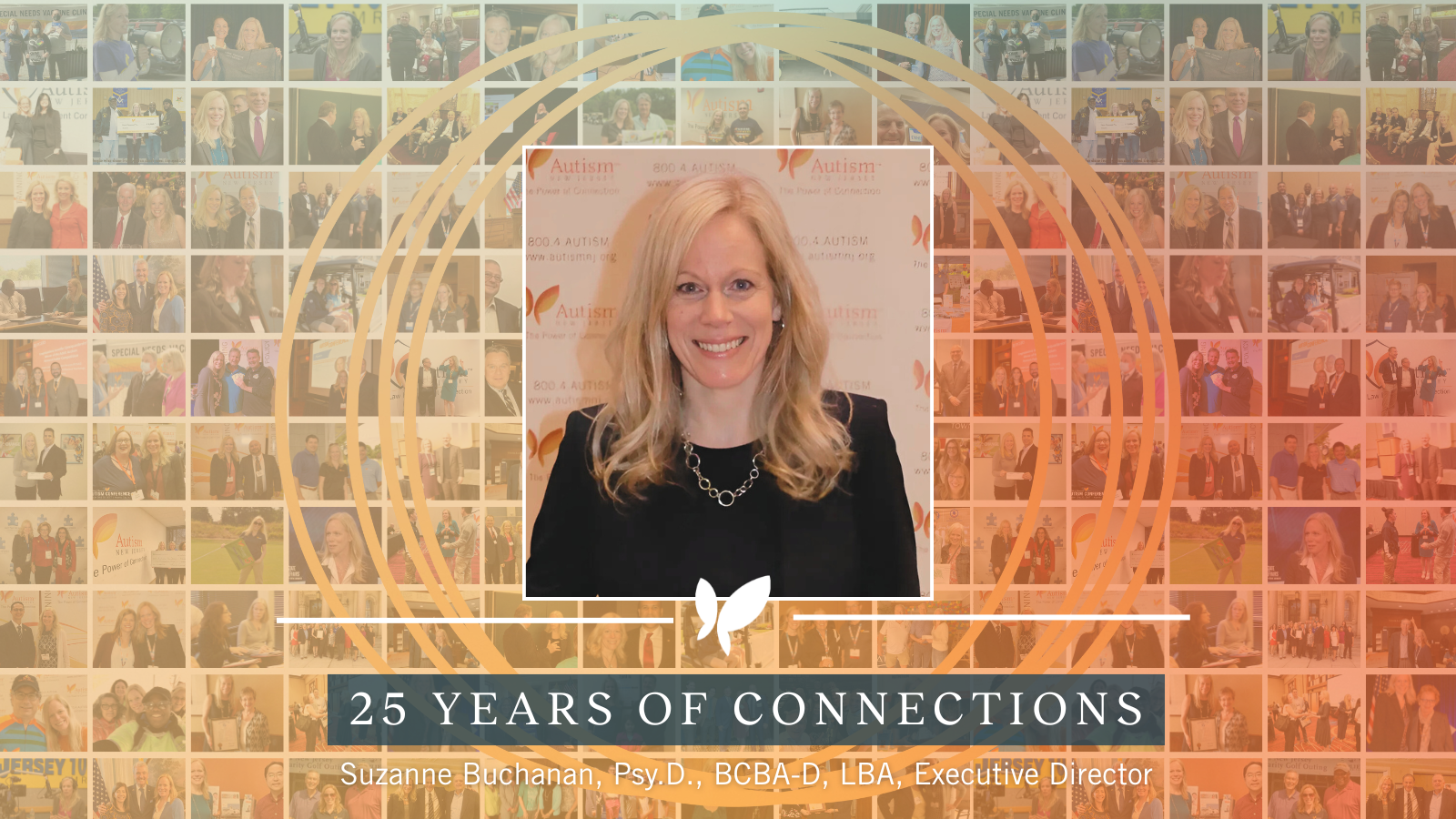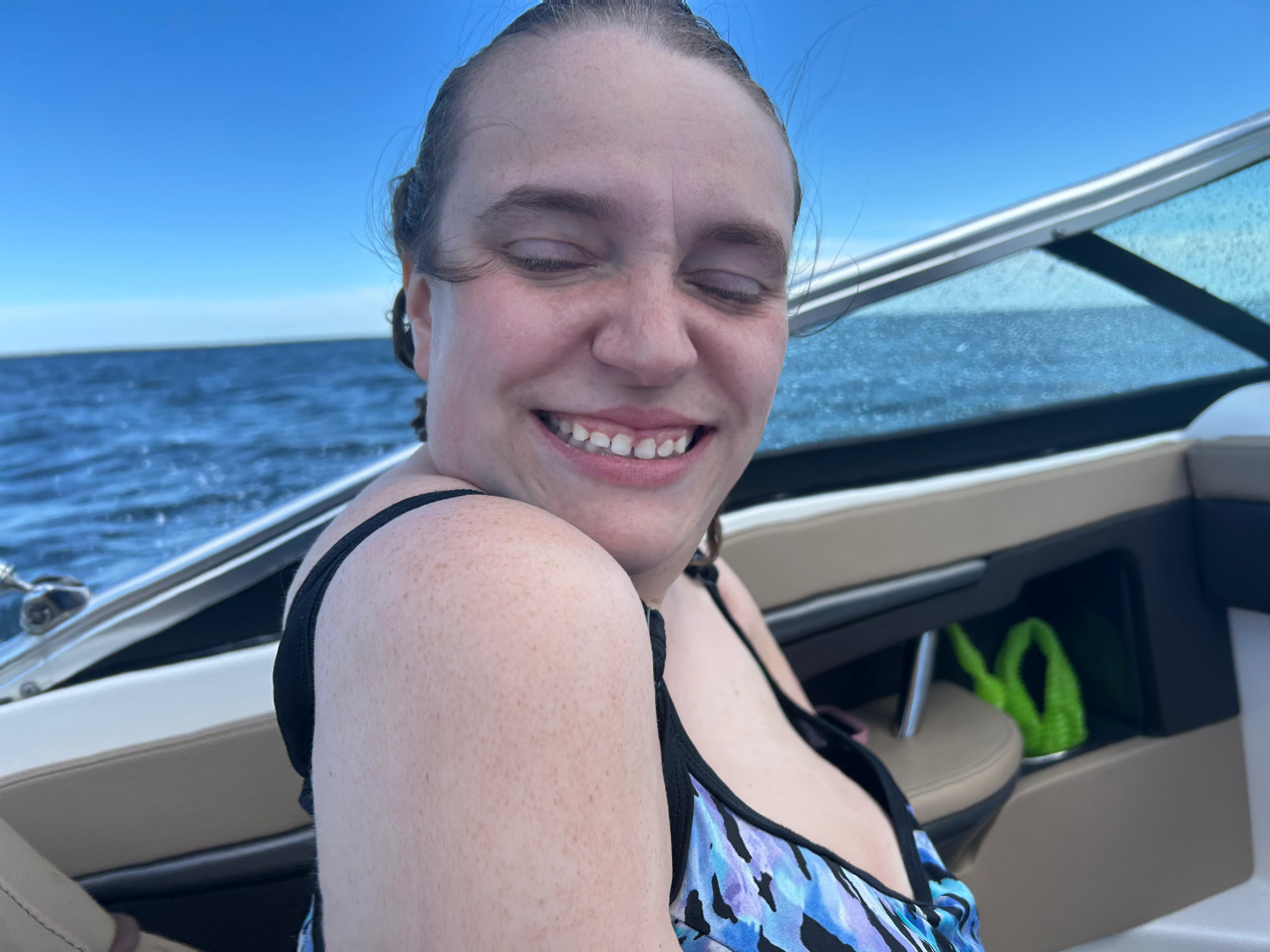
By: Cassidy Grom, Communications Director
For many across the state, the name “Suzanne Buchanan” is synonymous with “Autism New Jersey.” Our agency’s executive director is a staunch advocate for the autism community and uses her clinical expertise, policy savviness, and organizational leadership skills to meet the autism community’s unique needs. She started working for Autism New Jersey in 2000 as the clinical director and 13 years later transitioned into her current role, where she now oversees more than 20 staff members and countless partnerships throughout the state.
With her 25th anniversary with the agency approaching at the end of this month, we thought it was time to sit down with her and take stock of everything that has happened during her tenure so far.
This interview has been condensed and edited and is the first in a series of interviews with the Autism New Jersey staff.
Cassidy Grom: You’ve been with Autism New Jersey for 25 years and the agency has made a lot of progress in the state at that time. What are you most proud of?
Suzanne Buchanan: Oh wow, there is so much that I’m proud of. I’m proud of the rock-star team I’ve built that works so well together to meet the evolving needs of the autism community. I’m proud of some major milestones: we were able to get ABA therapy covered by insurance and Medicaid, we were the lead advocacy organization behind the law requiring behavior analysts to be licensed in New Jersey and we have been working with our Law Enforcement initiative to change how officers interact with individuals with autism.
I’m also very proud that we’ve kept the helpline, conference, and ambassador program going all these years, brought back family services, and developed more robust partnerships with the State Departments of Health and Children and Families.
CG: How has the autism community and the state changed over the past 25 years?

Executive Director Suzanne Buchanan reflects on 25 years at the agency.
SB: When I first started, when autism was mentioned in the popular press, my family would call me and let me know there was a new article about autism. Somewhere around 2010, that changed, and there was so much more awareness of autism.
Another big shift has been the expanded definition that includes people who may have previously been considered to have Asperger Syndrome. They have different needs than individuals who would today be considered to have profound autism, those who have limited communication and may exhibit severe challenging behavior. That shift meant both expanding our services to make sure we are addressing everyone’s needs while also focusing our advocacy efforts to help those with profound autism.
CG: If you could snap your fingers and make one change to New Jersey’s autism landscape what would it be?
SB: Generally, I want to reduce suffering in any way that we can. More specifically, that there would be enough treatment professionals to meet our community’s treatment needs, so people can learn new skills, reduce their challenging behavior, and families can have peace of mind. I envision a world where people with autism are safe and valued, and communities are built to be more autism friendly.
CG: When times get tough, how do you stay inspired to do this work?
SB: Compared to what so many individuals and families face every day, my work is easy. They inspire me. It’s their resilience, their heartbreak, all of it – their whole experience makes me want to have the biggest impact possible. So, we do as many small and big things as we can. And as everyone in our community knows, those “small” wins are huge. When we connect a family with an autism-friendly dentist, that’s a win. When we teach pediatricians about what families of children with autism need, that’s a win. When we change state laws, that’s a win.
Something else that drives me is kindness — not just in the moment, but kindness that ripples out and lasts. That’s why I keep coming back to this question: “What’s going to reduce suffering in the long run and lead to the greatest good?” We’ve been able to help tens of thousands of families throughout the state, but there are always more people we can reach, and I want to create systemic change to make their lives better.
CG: How has this work at ANJ and the people you met through it impacted your life over the past 25 years?
SB: This work has been the honor of a lifetime. Having the opportunity to reduce other people’s suffering while working with people I admire — I just feel like it is my calling. There are jobs, careers, and then there are callings. This is my calling.
My first introduction to autism was babysitting a kid in Flemington when I was an undergraduate. His family was really struggling. His dad took on a second job to pay for therapy. His mom was absolutely exhausted, and his brother couldn’t understand why he wouldn’t play with him. They changed my life and made me realize that if I can help reduce individuals’ and families’ suffering even just a little bit, then it is all worth it.
CG: As you look into the next decade for Autism New Jersey, what are your priorities?
SB: Funding for Medicaid programs is top of mind right now. Families need health insurance to access the therapies that help individuals with autism be safe and make progress. And adults with autism need Medicaid-funded home- and community-based services like the Community Care Program and the Supports Program. We’re in an uncertain and challenging time.
We are also prioritizing our severe challenging behavior initiative to help keep people with autism and their caregivers safe. And of course, it is our ongoing goal to support families by providing them with accurate information about their rights and provide them with emotional support and opportunities to connect with each other.
Ultimately, we want to connect with anyone who could use our help.
CG: Shifting to some more light-hearted questions; what do you like about where you live?
I live in Allentown, NJ and the whole town is historic. It’s beautiful. I love walking down Main Street and learning about the people who came before us.
CG: I heard you eat a lot of sweet potatoes. How many do you estimate that you eat per week?
About two or three.
That’s more than 100 a year.
They are a super food!
CG: Our organization is honored to have hundreds of volunteers and ambassadors across the state. So, your son, Michael, volunteers here and I heard your other kids have, too. How have they helped?
SB: Yes, all three have. My older son, C.J., called providers on insurance company lists when we were checking network adequacy. My daughter, Lindsey, digitized our historical paper conference line ups. And my youngest, Michael, is looking into sports and leisure options around the state and how we can expand them so we can get more people involved. We’re all in!








